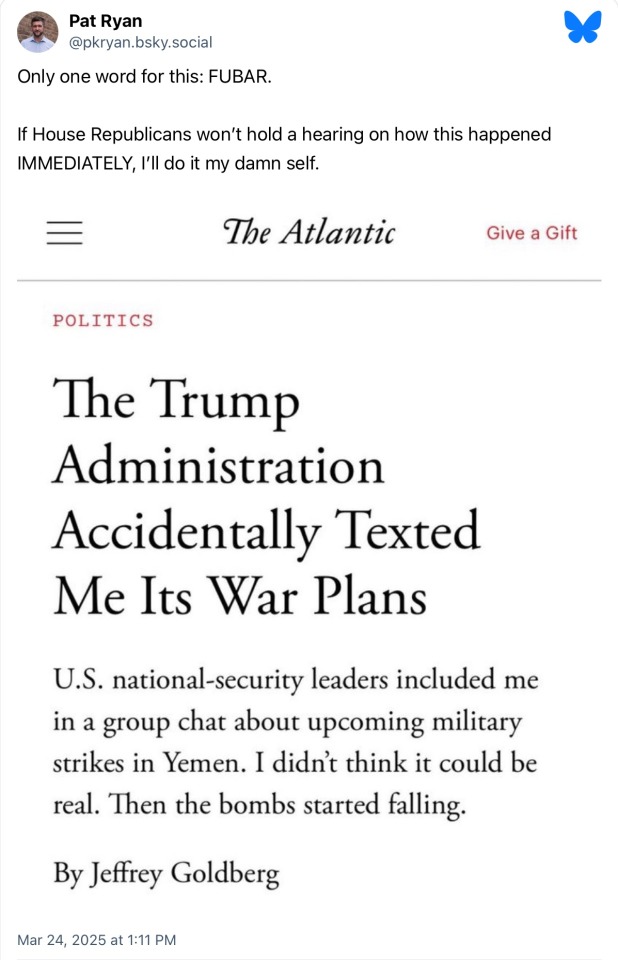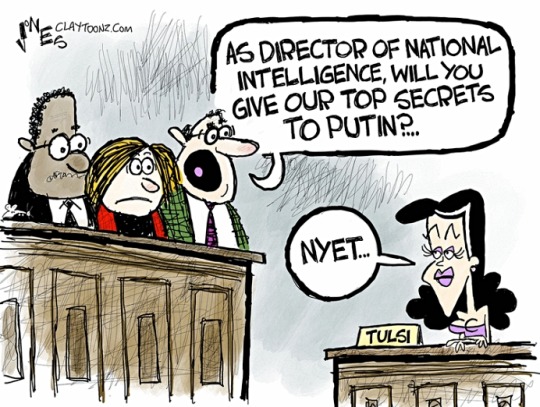#National security
Explore tagged Tumblr posts
Text
Them using Signal wasn't stupidity, it was done on purpose to avoid having any official records of their conversations--which is legally required. Avoiding an official record is part of Project 2025 to help them all avoid charges or any protests.
That is the part that needs to get focused on, while also continuing pressuring everyone involved until the issue is unavoidable and again, they back down or admit what they are.
And it needs to get stressed over and over again to Republicans who love the military or are in the military--this will get soldiers killed. This is a breach of National Security and it was done on purpose.
These are deeply evil people but this groupchat o'death was done deliberately because Signal will delete their messages.
Tulsi Gabbard will get US soldiers killed. Drunk-ass Pete Hegseth will get US soldiers killed. J.D. Vance will get US soldiers killed. That person in the chat who was *in Russia* will get US soldiers killed.
Regular soldiers who even slightly might breach operational security are punished, even if it was an accident.
You want everyday Republicans and military personnel to get mad about this? Say that. Say all of that. And remember that it's all to "expand" US (Russian) interests and appear strong in true fascist style.
And every Republican and Democratic Senator who voted to confirm these people should not be forgotten either.
#hegseth#pete hegseth#us politics#that will affect the rest of the world unfortunately#national security#tulsi gabbard#maga
6K notes
·
View notes
Text


this is the most timeline ever!!!!
#idiocracy#dui hire#okay ❤️ yay ❤️#oh well#political memes#pete hegseth#us politics#middle east#yemen#the atlantic#trump administration#republicans#democrats#american politics#fuck trump#united states#leftist memes#leftist#leftism#foreign affairs#donald trump#western politics#meme page#current events#national security
2K notes
·
View notes
Text

In a high-level alert that revealed a geo-political rival of the United States could soon become the first nation capable of wielding the most powerful force in the universe, the Pentagon warned Friday that China was actively developing love, the greatest weapon of all.
The alert, issued to the American public and top U.S. allies, stated that China had made significant advances in love, a transcendent source of strength that ultimately triumphs over any defenses an enemy might try to erect against it. Weapons experts confirmed that if it were unleashed, the all-consuming feeling could strike the hearts of billions throughout Asia and the Pacific, even reaching the West Coast of the United States.
Full Story
2K notes
·
View notes
Text
It's an ethics AND a safety issue. Trump is planning to stop crash/safety reporting Musk's cars.
A more graphic explanation of why we need to monitor this. (Shows crashed cars, but not the bodies). It's from that time Tesla did deadly beta testing that killed and injured a bunch of people.
Some of these are mostly focused on the national security implications of Musk, SpaceX, and Starlink, but the conflict of interest over things like Self driving cars matter too. It's a fundamental problem that Trump is basically letting Elon Musk make so many decisions for his own benefit.
#Elizabeth Warren#Donald Trump#Elon Musk#Ethics#conflicts of interest#Security Clearance#Tesla#Autopilot#safety#billionaires#1%#Space X#Starlink#National Security
1K notes
·
View notes
Text
I'm really getting tired of pointing out what dip-shits these people are.
Remember when Trump said he would only hire the best people? Well, Pete Hegseth, the raging alcoholic Fox News personality he installed as the goddamn Secretary of Defense accidentally texted U.S. military strike plans in Yemen to Jeffrey Goldberg, the fucking editor-in-chief of The Atlantic.
These were "highly sensitive and classified details about the Pentagon's plan to carry out military air strikes against the Houthis, who have been launching attacks on Western commercial vessels in the Red Sea for more than a year." If that publication had decided to cite details from the texts, our service members could have been targeted and killed.
Oh, and before you MAGA boot-lickers come at me about this being "fAkE nEwS" or whatever you call facts that don't fit your weak-ass narrative: The White House admitted the mistake.
#trump administration#peter hegseth#national security#the atlantic#jeffrey goldberg#national security leak#maga cult#yemen#houthis
624 notes
·
View notes
Text

#us politics#politics#cw: politics#donald trump#trump administration#trump#fuck trump#president trump#jd vance#white house#group chat#signal#war plans#usa#us news#us military#the atlantic#star trek ds9#ds9#st ds9#star trek deep space nine#deep space 9#star trek#in the pale moonlight#american politics#national security#natsec group chat scandal#signal app#pete hegseth#mike waltz
318 notes
·
View notes
Text

#Atlantic editor#Democratic Congressman Pat Ryan#National Security#houthi rebels#yemen#Republican clown show#republican assholes#maga morons#traitor trump#crooked donald#republican hypocrisy#traitor#resist#republican values#republican family values
306 notes
·
View notes
Text
The way I truly have nothing to say about the fact that a journalist from The Atlantic was accidentally added to a top-secret war-planning group chat on an unsecured texting app run by the same people who brought you "but her emails." I'm so fucking tired.
#politics#us politics#trump#donald trump#american politics#national security#natsec group chat scandal#signal app#jd vance#pete hegseth#mike waltz#department of defense#yemen#hillary clinton#but her emails
298 notes
·
View notes
Text

#no kings#donald trump#trump administration#trump#fuck trump#president trump#doge#jd vance#america#fraud#elon musk is a fraud#trump is a fraud#fraudprevention#frauddetection#government#elon#national security#trump 2024#president musk#fuck maga#maga morons#maga cult#maga 2024#republicans#gop#fuck doge
177 notes
·
View notes
Text
Petition to ban X in Canada before the next election:
This isn't just about censoring opinions we disagree with- as the petition notes, Musk is a government official (though calling him "a cabinet minister" is technically incorrect) of a now-hostile foreign country, one which openly aspires to annex Canada and destroy our country and sovereignty, and who uses his platform to further his political goals, including by election interference.
Banning X-now, before the next Federal election-is a matter of national security and survival for Canada.
If you are Canadian, please sign the petition.
#US#Canada#Politics#Musk#X#Twitter#Xitter#Fuck Xitter#Ban Xitter#Elections#Propaganda#Misinformation#National Security#Canada Is Sovereign#Canada Is Free
197 notes
·
View notes
Text
Alex Samuels at Daily Kos:
President Donald Trump announced Friday that he pulled federal security protection for former top U.S. health official, Dr. Anthony Fauci, making him the latest casualty of Trump’s revenge tour. Fauci, who retired from government service in December 2022, served as the nation’s top infectious diseases expert amid the COVID-19 pandemic. He was protected by federal marshals, and later by a private contractor, that was paid for by the National Institutes of Health, according to The New York Times. Sources close to the situation also told CNN, which first reported the move, that Fauci’s detail was abruptly terminated on Thursday evening. This past June, Fauci said he and his family still receive death threats, in part, because right-wing figures like Trump repeatedly promoted baseless lies about the efficacy of the COVID-19 vaccine. “It’s a pattern,” Fauci told CNN, adding that when someone in the media or Congress “gets up and makes a public statement that I’m responsible for the deaths of X number of people because of policies or some crazy idea that I created the virus— immediately you can, it’s like clockwork—the death threats go way up.” In May 2022, for instance, a West Virginia man pleaded guilty to sending Fauci and other federal officials emails that threatened to kill them. Given that, and the public-facing role Fauci played during the pandemic, he’s now hired his own private security that he’ll pay for himself. During a press conference in North Carolina on Friday, Trump defended the move as a natural progression that comes once officials no longer serve in the federal government. He also suggested that Fauci has more than enough money to pay for his own security detail.
[...] This is the latest move in Trump’s revenge arc. Earlier this week, he yanked security detail from his former national security adviser, John Bolton, who sharply criticized the president in his memoir, “The Room Where It Happened.” Trump cited the memoir as one of his reasons for revoking Bolton’s security detail. [...] In addition to Bolton, Trump also moved to end security details for former Secretary of State Mike Pompeo and former State Department official Brian Hook. Both men were granted additional protection because they faced threats from Iran. At least, in Fauci’s case, Trump might not be able to retaliate against him personally. Former President Joe Biden preemptively pardoned Fauci on his last day in office, citing concerns about politically motivated investigations into the doctor, who had served for decades as the nation’s top infectious diseases expert.
Pettiness in action by Tyrant 47.
151 notes
·
View notes
Text







#tiktok#donald trump#fuck trump#us politics#trump#president trump#trump administration#us government#pete hegseth#the Atlantic#Jeffrey Goldberg#fuck hegseth#trump's cabinet#trump's america#trump's second term#fuck donald trump#national security
143 notes
·
View notes
Text



#signals leak#trump regime#christofascists#atlantic leaks#the atlantic#pete hegseth#jeffrey goldberg#oopsie daisy#national security#we are fucked#jd vance#couchfucker in chief#atlantic text leak
65 notes
·
View notes
Text

Donald Trump's intention to appoint Putin fangirl Tulsi Gabbard as Director of National Intelligence and QAnon conspiracy nut Kash Patel as FBI Director show that his main objective is to weaken the United States to the benefit of Russia.
John Bolton compares Kash Patel to Soviet secret police leader
Tulsi Gabbard’s history with Russia is even more concerning than you think
#donald trump#tulsi gabbard#putin fangirl#director of national intelligence#vladimir putin#national security#kash patel#fbi#qanon#trump's unqualified nominees#john bolton#clay jones
134 notes
·
View notes
Text

President Donald Trump fired Joint Chiefs Chairman General C.Q. Brown and five other top military leaders in an unprecedented Pentagon overhaul. Breaking tradition, Trump nominated retired Lieutenant General Dan "Razin" Caine to replace Brown, marking the first time a retired officer has been chosen for the role.
The shakeup also includes replacing Navy Chief Admiral Lisa Franchetti, the first woman to lead a military branch, and other senior officials. Critics, including Democratic lawmakers, called the move a dangerous politicization of the military, warning it undermines trust and national security. This dramatic shift signals a major transformation in U.S. military leadership under Trump's "America First" agenda.
#general knowledge#affairsmastery#generalknowledge#current events#current news#upscaspirants#upsc#generalknowledgeindia#world news#breaking news#news#government#public news#usa#us politics#america#politics#united states#donald trump#trump administration#trump#president trump#military#republicans#democratic party#democrats#policy#usa politics#political news#national security
61 notes
·
View notes
Text

Reminder that your Internet provider can and does log and review everything you do. So, yeah, huge security breach.
50 notes
·
View notes